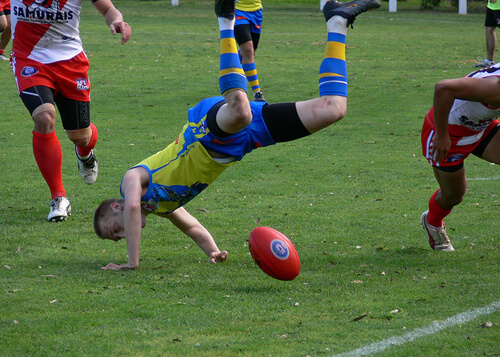While hamstring injuries head the list for the most common reasons you’ll be sidelined, knee injuries are a close second.
Considering the punishment your knees will take during a game, it’s hardly surprising that so many players suffer from knee pain.
During a match, or even during practice, your knees are subjected to a lot of punishment.
They absorb the shock of impact from running and jumping, and are twisted and contorted as you play. It may be more surprising that more knee injuries do not occur.
Common Knee Injuries
The knee is actually a very complex amalgam of joints, cartilage, ligaments, tendons, and muscles, and in part simply because it contains so many components, can be subject to a number of injuries. Let’s face it, the more ‘working parts’ there are in anything, the greater the chance for trouble.
- There are 5 ligaments associated with your knees and any or all of them can be injured. A ligament is a tough band of tissue that attaches the different parts of your knee bones to one another. These injuries can range from mild to severe and will involve varying levels of pain, depending on how bad the injury is. This kind of injury is called a sprain.
- Jumper’s Knee (which might also be called Football Knee) involves damage to the tendon that attaches your quadriceps muscle to your kneecap and tibia. Unlike many knee injuries, Patellar Tendonitis can sneak up on you, with pain developing so gradually that you may be able to ignore it for a time.
- The cartilage in your knee is actually called the meniscus and is composed of two ‘C-shaped’ pads that provide a cushion between your thigh bone and your tibia. Meniscus injuries usually occur when you twist your knee. Some tears run along the grain of the cartilage, some across it, and some will rupture it completely.
- Osteoarthritis of the knee is fairly common in athletes not only because of the strain put upon the knee, but because of the repetitive nature of sports – you are performing the same actions over and over. The cartilage between your knee bones is what provides cushioning so that the bones don’t simply grate together. Very physical sports, such as AFL matches, can destroy the padding so that the bones will rub together, causing pain.
Treatment for Knee Injuries
Pain is Nature’s way of telling us, “Lay off for a while, mate”, and once you experience knee pain, it’s time to take some time off the field. A small pain that is ignored can easily become not only a large pain, but can also result in permanent damage.
- The first step with dealing with knee pain will be to have your doctor take a look at it. In most cases, he will prescribe RICE – Rest, Ice, Compression, and Elevation.
- Over the counter pain relievers will usually handle most knee pain, but you may be prescribed stronger medications or even steroids to reduce inflammation.
- In extreme cases, surgery may be required to repair serious damage.
It might also be a good idea to schedule some massage therapy during your time down. This can benefit your knee, and speed recovery:
- Warmth is brought to the affected area.
- Increased circulation hastens healing.
- Released endorphins reduce pain.
- Excess fluid from swelling is drained off.
Can Knee Injuries Be Prevented?
There is no 100% guaranteed way to prevent injuries to your knees, but there are a few ways to minimize the possibility:
- Keep in shape year-round. Strong muscles will not only be less likely to suffer injury, they will also provide support for tendons, ligaments, and the knee joint.
- Warm up and stretch before you hit the field; cold, tight knees are more likely to get hurt than warmed, flexible ones.
- Massage therapy is an excellent way to maintain flexibility in your knee, and your whole body for that matter.
- Don’t overtrain. Alternate field work with walking, swimming, or even a day off.
- Use the best footgear possible, and remember to get new when there is any sign of wear.
I’ve treated both AFL and local footy players over the years and a common occurrence I have noticed is that the on going maintenance massages are not done religiously hence why when I see players come to me to help alleviate injuries or pain, it’s been left for far too long.
An advantage of getting regular massage treatments is getting on top of any problems before they become a problem.
Now that we are getting into the footy finals would be a great time to book in for your treatments.
I look forward to assisting any of you who need some help.
Stay well.
